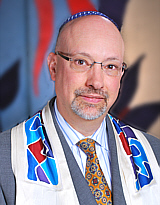”Looking up, Abraham saw three men standing near him. As soon as he saw them, he ran from the entrance of his tent to greet them and, bowing to the ground, he said, “My lords, if it please you, do not go past your servant” (Genesis 18:2-3).
When I was 17 I learned about immigration at a NFTY kallah. Our group leader told us about his grandmother. She came to this country on a steamship in one of the last waves of Eastern European Jewish immigration, just a child and all alone. She was on the lowest deck, hundreds crammed together in the oppressively hot steerage. There was very little food, practically no water and definitely no sanitation. But life was different on the upper deck where the rich were pampered by servants, and this little girl would often go to a place where she could glimpse the opulence above. She would dream about being a princess, about having the beautiful clothes and shoes and jewelry she would see as the fairy tale people would glide by. One night this little girl looked upward at the first class deck and happened to lock eyes with an elderly woman. At first the little girl glanced away, downward, terrified that she might be in trouble. But the elderly woman called to her and smiled, clearly infatuated. She motioned, as if to ask how old the girl was and then motioned how pretty she was. And they made a date to meet the next night at the same time.
Then came the miracle. Each night that elderly woman would bring an orange, or a loaf of bread, or something sweet, and drop it down from that high deck into that little girl’s grateful hands. Many died on that journey, but not my counselor’s grandmother. She survived thanks to the kindnesses of an elderly woman who nourished her each night. Our NFTY counselor began to cry as he spoke. If not for those nightly gifts his grandmother might not have made it and his family never would have come into existence, indeed, he would never have been born.
Abraham and Sarah made a similarly arduous journey; they began in Haran, modern day northern Turkey, and made their way south, inspired by a vision of greatness, security, and rootedness in the land God promised would be theirs and their descendants’ forever. That journey was also punctuated by dangers and crippling unforeseen obstacles. They arrive to discover the land is riddled with famine and must immediately leave. Thankfully, by this week’s parashah, they are comfortably settled, and when strangers arrive at their encampment at Mamre, Abraham eagerly welcomes them into his home and extends warm hospitality. Abraham certainly remembered his own feelings of vulnerability and fear as he made his way through unknown territory and is eager to dispel such feelings in his guests. Although we will not read the Torah’s mitzvah to “know the feelings of the stranger” for many chapters yet, such empathy and sensitivity surely guided Abraham’s hospitality as his guests arrived.
We comfortable American Jews cannot begin to imagine the motivation to leave home and commence a dangerous journey to an unknown destination, to say goodbye to loved ones forever and risk death or capture, to know you will have to fashion a life from nothing. And yet that motivation is at the heart of the current debate over immigration policy in our country, twelve million human beings who came here in search of a better life. So when we hear politicians say things like “Send them home; deny their children an education; they’re aliens, parasites; they’re ruining our country,” we, the grandchildren and great grandchildren of immigrants, should be outraged. We should call it what it is: self-righteous, racist and destructive, no different from the dark racist epochs of our history that we, thank God, have rejected.
Immigration no doubt is a complex issue. Because Jews are disproportionately the victims of terror we understand that border security and a sensitive, compassionate discussion about how many newcomers we can successfully integrate into society are important components of any sound and viable national policy. But talk about keeping 12 million people in the shadows or throwing them out should make us, a people often forcibly removed from our homes, furious and disgusted.
My wife, Rebecca, volunteers for a small program through our local Roslyn schools; she visits weekly with very young children in the poorest families in our community. They live in tiny apartments in Roslyn village, often 3 generations in two bedrooms. Their parents are bus boys, cleaning women, and gardeners. They work long days, speak little English and have very little. They are here so their children can become the next generation of doctors and lawyers. They remind me of my NFTY counselor’s grandmother, of Abraham and Sarah. No different, really. Any sound and compassionate immigration policy will enable them call this country their home. And we American Jews, now free and secure, should be at the forefront of this fight.

